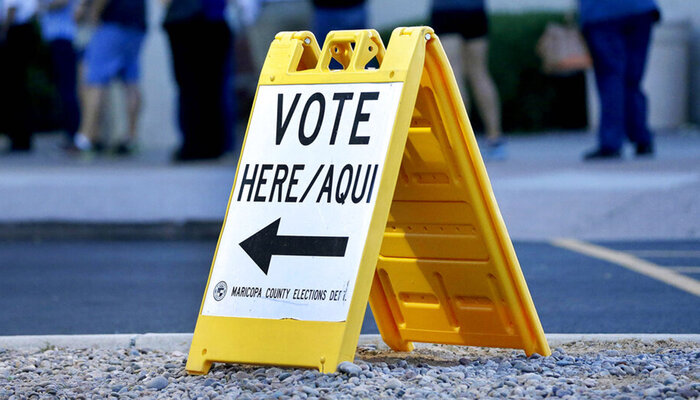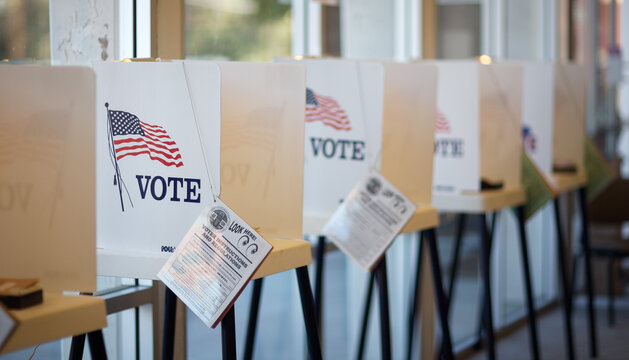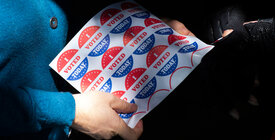
Voting Laws Roundup: May 2022
This year, state lawmakers have focused on enacting election interference legislation, with six states already passing nine laws that threaten to undermine voters’ confidence in the security of elections.

Part of
Click here for the most recent Voting Laws Roundup.
This year, state lawmakers, who spent 2021 passing laws that made it harder to vote, have focused more intently on election interference, passing nine laws that could lead to tampering with how elections are run and how results are determined.
Election interference laws do two primary things. They open the door to partisan interference in elections, or they threaten the people and processes that make elections work. In many cases, these efforts are being justified as measures to combat baseless claims of widespread voter fraud and a stolen 2020 election.
Between January 1 and May 4, six state legislatures — Alabama, Arizona, Florida, Georgia, Kentucky, and Oklahoma — have passed nine election interference laws. As of May 4, at least 17 such bills introduced this year are still moving through five state legislatures. Moving bills are those that have passed at least one chamber of the state legislature or have had some sort of committee action (e.g., a hearing since the beginning of 2022, an amendment, or a committee vote). In total, lawmakers in 27 states have proposed at least 148 election interference bills.
In many of the same state legislatures, lawmakers have continued to introduce or enact laws that restrict access to the vote. Legislation is categorized as restrictive if it would make it harder for eligible Americans to register, stay on the rolls, and/or vote as compared to existing state law. In addition to two such laws enacted in Arizona and Mississippi, a restrictive ballot initiative in Arizona passed both houses and will be placed on the ballot for voters in the November general election.
As of May 4, at least 34 bills with restrictive provisions are moving through 11 state legislatures. Overall, lawmakers in 39 states have considered at least 393 restrictive bills for the 2022 legislative session. Since the beginning of 2021, 18 states have passed 34 restrictive voting laws, which can disproportionately affect voters of color.1
At the same time, Arizona, Connecticut, New York, and Oregon enacted five laws that expand access to the vote. Legislation is categorized as expansive if it would make it easier for eligible Americans to register, stay on the rolls, and/or vote as compared to existing state law. As of May 4, at least 48 bills with expansive provisions are moving through 16 state legislatures and the DC City Council. Overall, lawmakers in 44 states and Washington, DC, have considered at least 596 expansive bills for the 2022 legislative session.
Almost half of the state legislatures meeting in 2022 have now ended their legislative sessions.2 Legislatures are in the second year of their two-year sessions, when they generally tend to pass fewer laws than in the first year. This year follows that trend.
Election Interference Legislation
Between January 1 and May 4, six states (Alabama, Arizona, Florida, Georgia, Kentucky, and Oklahoma) have enacted nine election interference laws.3 As of May 4, at least 17 election interference bills are moving through five state legislatures.4 Overall, lawmakers in 27 states have introduced at least 148 election interference bills in the 2022 legislative session.5
This legislation is fueled by election denialism and falsehoods about voter fraud. The passage of election interference legislation is part of an alarming trend that emerged in state legislatures in 2021 and represents a direct legislative attack on fair election administration.
Enacted Election Interference Legislation
The nine enacted election interference laws permit partisan actors to interfere with elections operations or overturn election results, direct new resources toward prosecuting election crimes, and threaten election officials with criminal penalties. Seven of these laws will be in place for the 2022 midterm elections.6
- Three laws in Georgia create a risk of partisan interference with elections and election results. Two of the bills, GA H.B. 1368 and GA H.B. 1015, replace current election superintendents and create new county boards of elections in Miller and Montgomery counties. The members of the boards will be appointed by partisan county commissioners. A similar bill, GA H.B. 1432, changes the makeup of the Dawson County Board of Elections so that one party can effectively control a majority of the five seats. This legislation is part of a particular trend where the Georgia Legislature has given county partisan commissioners more control over election administration. Similar Georgia laws from 2021 led to the ouster of several Black election officials.
- Two laws in Georgia and Florida create new entities dedicated to pursuing election crimes. Florida’s, FL S.B. 524, creates a new election crimes office within the Florida Department of State, tasked with investigating and referring for prosecution violations of election law. The law also requires the governor to appoint dedicated special officers to receive and investigate election law complaints in each law enforcement region across the state. Similarly, GA S.B. 441 grants the Georgia Bureau of Investigation authority to investigate election crimes and refer any violations for prosecution. Both pieces of legislation expand existing authority and direct more resources toward investigating and prosecuting election crimes, risking the intimidation or harassment of voters and election officials. This legislation is fueled by the false pretense of voter fraud, which itself rarely occurs but continues to be used as a baseless justification for additional state investigative and prosecutorial resources.
- Four laws in four states create new criminal penalties for election officials. In Alabama, Kentucky, and Oklahoma, three new laws make it a criminal offense to solicit, accept, or use private funding for election-related expenses.7 In 2020, election officials’ acceptance and use of private funding enabled them to run safe and secure elections. Criminalizing that action prevents election officials from accessing funding beneficial for election administration and puts them at risk for prosecution for otherwise ordinary conduct. And in Arizona, a new law establishes a felony offense for an election official who fails to comport with new restrictive citizenship verification requirements and inadvertently accepts a noncitizen’s voter registration.8 Imposing criminal penalties on ordinary election administration conduct or inadvertent mistakes could deter individuals from serving as election officials. At a time when election officials are already fearful for their safety, the prospect of new criminal penalties adds another deterrent to staffing elections.
Election Interference Bills That Are Moving
Bills initiating biased election reviews
Five bills moving in three states (Arizona, New Hampshire, and Rhode Island) would initiate biased, suspect reviews of elections and election results.9 These reviews would lack transparency and fail to satisfy basic security, accuracy, and reliability measures. They are also part of a movement in state legislatures to undermine faith in the electoral process.
- Four of the bills moving in two states (Arizona and Rhode Island) would require or authorize suspect audit processes for future elections.10 This legislation uniformly lacks basic security, accuracy, and reliability measures for these suspect reviews, bestowing inordinate discretion on individuals, imposing no transparency requirements, or failing to mandate clear guidelines for how results are reviewed. For example, in Arizona, AZ S.B. 1259 would give the attorney general, the secretary of state, and the legislative council, as well as any Arizona resident, the broad power to demand a recount of an election or of specific precincts, voting centers, or election districts, despite the vote margin not meeting the recount threshold.
- Three of the bills moving in Arizona would allow for citizens either to initiate flawed review processes or conduct their own reviews of voted ballots.11 These bills fail to satisfy security and reliability measures and would open the door to attempts by outside groups to delegitimize the election process. For example, AZ S.B. 1629 would require digital images of all voted ballots in federal elections to be made publicly available within 48 hours of an election district’s canvass results being published. This would allow outside groups to publish their own misleading audits of any election and would also risk exposing voters’ personal information.
Bills that expand prosecutorial authority related to elections
Three bills moving in two states (Arizona and Oklahoma) would expand law enforcement’s power over election-related matters or would direct additional resources toward investigating or prosecuting alleged election-related crimes.12 Given that actual voter fraud is vanishingly rare, these new powers could easily be misused to harass or intimidate voters and election officials for partisan gain, threatening fair elections. For example, AZ S.B. 1475 would grant the attorney general new election-related investigative powers.
Bills that impose new criminal or civil penalties on election officials
Five bills moving in three states (Arizona, Oklahoma, and New Hampshire) would impose new criminal or civil penalties on election officials for actions to expand voter access or for minor mistakes during their ordinary course of conduct, adding the risk of prosecution to already burdened election officials and contributing to pressures that are pushing election officials to leave the profession.13 For example, AZ S.B. 1574 would make it a misdemeanor for any county recorder to fail to comply with an unclear and complicated recordkeeping requirement about “irregularities” on Election Day, and OK H.B. 3677 would make it a felony to obstruct the view or restrict the free movement of a poll watcher, which could empower more aggressive poll watcher interference at polling places.
Bills that transfer authority of elections
Five bills moving in two states (Arizona and Kansas) would transfer authority over specific aspects of election administration to different actors in ways that could open the door to political interference.14 For example, AZ S.B. 2379 would allow the legislature to appoint its own field personnel to review electronic voting systems on Election Day and recommend changes to voting procedures. These field personnel would be duplicating existing statutorily mandated efforts by the secretary of state and would not be subject to any clear transparency or security requirements.
Restrictive Legislation
Between January 1 and May 4, Arizona and Mississippi enacted two laws that restrict access to the vote.15 Missouri, New Hampshire, and Oklahoma each have a restrictive bill that passed both chambers and was ready for the governor’s signature or veto as of May 4.16 Additionally, the Michigan Legislature passed two bills with restrictive provisions, but the governor vetoed both. In Wisconsin, state lawmakers passed three bills with restrictive provisions that the governor also vetoed.17
Although legislatures have been slow to pass restrictive legislation, at least 34 bills with restrictive provisions are still moving through 11 state legislatures.18
Overall, lawmakers in 39 states have considered at least 393 restrictive bills for the 2022 legislative session.19
Enacted Restrictive Legislation
Arizona and Mississippi have enacted restrictive documentary proof of citizenship laws for voter registration. The Mississippi law will be effective for the 2022 midterm elections; the Arizona law will go into effect at the end of 2022. The laws were enacted despite the U.S. Election Assistance Commission determining that documentary proof of citizenship requirements are not necessary to determine a voter’s eligibility and despite a federal court striking down similar requirements last year. Documentary proof of citizenship laws may disproportionately impact Black and Latino voters and elderly, low-income, and rural voters.
The Arizona law, already subject to legal challenges, will expand the state’s proof of citizenship requirement for voter registration.20 Under current state law, if an individual registers to vote in Arizona without showing proof of citizenship, they are entitled to vote only in federal elections. The new law requires election officials to verify applicants’ citizenship status through existing databases, and if they are unable to do so, to require applicants to provide documentary proof of citizenship. Voters unable to provide documentary proof of citizenship will be prohibited from voting in presidential elections and from voting by mail in all federal elections, in addition to already being barred from voting in state and local elections.
The law defies the Supreme Court’s holding in Arizona v. Inter Tribal Council of Arizona, Inc. that individuals registering to vote using the federal voter registration application need not provide documentary proof of citizenship.21 Additionally, because this new law may retroactively require documentary proof of citizenship from currently registered voters, it has been estimated that as many as 200,000 voters — some of whom have been registered voters for decades — could be at risk of having their registrations canceled. The new law also includes provisions requiring the state attorney general to investigate and potentially prosecute certain applicants who are unable to provide documentary proof of citizenship.
Mississippi’s law imposes a new documentary proof of citizenship requirement in the state.22 Its restrictive impact will likely be more modest than Arizona’s law above because voter registration applicants may only be asked for documentary proof of citizenship after election officials have cross-checked two government databases. Voter registration applicants’ citizenship status will be checked against the state’s Department of Public Safety database and, if necessary, against a U.S. Citizenship and Immigration Service (USCIS) database. If an applicant is flagged as a noncitizen, they must provide documentary proof of citizenship within 30 days. But citizenship data in state public safety databases as well as the USCIS database have been found unreliable, and this law could result in unlawful and inaccurate voter purges.
In addition to these enacted laws, a restrictive voting ballot initiative in Arizona passed both houses and will be placed on the ballot for voters in the November general election.23 If successful, the ballot initiative would require mail voters to provide a state license, Social Security, or unique voter identification number when returning their ballots. A similar law enacted in Texas last year led to significant mail ballot rejections during Texas’s primary election earlier this year. Additionally, the ballot initiative would limit the types of ID that a voter can present when voting in person by eliminating the use of non-photographic identification alternatives. The resolution would empower any voter in the state to sue election officials to compel enforcement with the new ID provisions, potentially drowning election officials in lawsuits and diverting resources from election operations.
Restrictive Bills That Are Moving
As of May 4, at least 34 bills with restrictive provisions are moving in 11 states. The moving restrictive bills focus on restrictions to mail voting, new voter ID requirements, and voter registration, among other barriers to voting.
Restricting access to mail voting. Of the restrictive bills that are moving, almost three-fourths (25 bills in 10 states) would curtail access to mail voting.24 Eight bills in five states would either impose a new or stricter ID requirement for mail voting, such as providing a driver’s license number or partial Social Security number to apply for or return mail ballots.25 Another six bills in five states would limit voters’ access to mail ballot drop boxes or prohibit the use of mail ballot drop boxes altogether.26
Other restrictions on mail voting in motion include legislation that would shorten the deadline to apply for a mail ballot or return a mail ballot; repeal no-excuse mail voting; and prohibit anyone, including an election official, from sending out unsolicited mail ballots.27
Imposing new or stricter voter ID requirements. Nine bills moving in five states (Arizona, Missouri, New Hampshire, New York, Pennsylvania) would implement new or stricter voter ID requirements for in-person voting.28 For example, a New Hampshire bill would eliminate a decades-old policy of providing Election Day registration to all voters by requiring voters registering on Election Day to vote by provisional ballot if they do not have an approved ID.29
Making voter registration more difficult. Five bills moving in five states would make voter registration more difficult, including shortening the deadline to register to vote, imposing new residency requirements that could impede students’ ability to vote, and prohibiting compensation for anyone who solicits a voter registration application, which could impose a significant burden on voter registration drives.30
Expansive Legislation
Between January 1 and May 4, Arizona, Connecticut, New York, and Oregon have enacted five laws that expand access to the vote.31 Maryland and Oklahoma also have three expansive bills that passed both chambers and were ready for the governor’s signature or veto as of May 4.32 At least 48 bills with expansive provisions are moving through 16 state legislatures and the DC City Council.33
Overall, lawmakers in 44 states and Washington, DC, have considered at least 596 expansive bills for the 2022 legislative session.34
Enacted Expansive Legislation
One Arizona law eliminates the two-year waiting period for individuals with multiple felony convictions to apply to have their voting rights restored.35 The other Arizona law requires cities and towns with populations greater than 20,000 to provide an accessible mail voting option for blind and visually impaired voters.36
The Connecticut law expands absentee voting excuses to allow voters who will be unable to appear at their polling place during some — rather than all — hours of voting on Election Day to vote by mail.37 The law also expands mail voting to caretakers of individuals who are sick or have disabilities.
The New York law extends the expanded definition of “illness” for voting absentee to include the risk of contracting or spreading a disease through the end of 2022.38 The expanded definition of illness had expired in January of this year.
The Oregon law expands online voter registration to individuals without a DMV record.39 Under the new law, voters with a Social Security number can use that number to register to vote online. Additionally, voter registration organizations approved by the secretary of state may now electronically submit voter registration cards on behalf of voters.
Arizona H.B. 2119 and the Connecticut and New York laws will be in effect for the 2022 midterm elections, while AZ S.B. 1638 will be effective on December 31, 2022; the Oregon Secretary of State has until 2026 to implement the enacted law.
Expansive Bills That Are Moving
Access to mail voting. Over a third of the expansive bills moving through state legislatures (19 bills in nine states and Washington, DC) are focused on expanding mail voting.40 The bills would expand the use of absentee ballot drop boxes, create or extend no-excuse absentee voting, require election officials to send applications to all eligible voters, require prepaid postage on mail ballot return envelopes, and allow voters to request to automatically receive absentee ballots for all elections.
Easier voter registration. Fifteen bills moving in 10 states would create more opportunities for individuals to register to vote, including bills that would implement same-day or Election Day registration, expand automatic voter registration, and allow individuals to register to vote online.41
Expanding voting access for voters with disabilities. Eleven bills in six states and the District of Columbia would make voting more accessible for voters with disabilities, including bills that would expand access to absentee ballots for voters with certain disabilities and a bill that would allow a voter with a disability to mark a mail ballot instead of signing it.42
Voting rights restoration. Three bills or resolutions in three states (Iowa, Massachusetts, Rhode Island) would extend the voting rights or ballot access of individuals with past felony convictions, including automatic restoration of the right to vote and requiring voter registration efforts inside correctional facilities.43
Endnotes
-
1
As of December 2021, the Brennan Center reported that 19 states passed 34 restrictive laws in 2021. After obtaining additional information about the way in which NV S.B. 84 and LA H.B. 167 will operate in Nevada and Louisiana, respectively, we have removed the two laws from the list of restrictive laws passed in 2021: https://www.brennancenter.org/our-work/research-reports/voting-laws-roundup-december-2021. -
2
Regular legislative sessions in Alabama, Arkansas, Connecticut, Florida, Georgia, Idaho, Illinois, Indiana, Kentucky, Maryland, Mississippi, Nebraska, New Mexico, Oregon, South Dakota, Tennessee, Utah, Virginia, Washington, West Virginia, and Wyoming concluded by May 4, 2022. Additional states may have concluded their regular legislative session between May 4 and the publication of this report. Montana, Nevada, North Dakota, and Texas do not hold regular sessions in even-numbered years. -
3
AL H.B. 194, AZ H.B. 2492, FL S.B. 524, GA H.B. 1015, GA H.B. 1368, GA H.B. 1432, GA S.B. 441, KY H.B. 301, OK H.B. 3046. In addition to these enacted laws, SC S.B. 108 was signed into law in South Carolina on May 13, after the cut-off date for this report. In addition to containing a mix of expansive and restrictive voting provisions, this law also creates a new mechanism for the state legislature to seek the removal of any member of the State Election Commission or the Commission’s executive director. This provision could allow for more partisan interference with election administration in the state. -
4
AZ H.B. 2237, AZ H.B. 2289, AZ H.B. 2378, AZ H.B. 2379, AZ H.B. 2780, AZ S.B. 1259, AZ S.B. 1285, AZ S.B. 1357, AZ S.B. 1475, AZ S.B. 1574, AZ S.B. 1629, KS S.B. 418, NH H.B. 1473, NH H.B. 1567, OK H.B. 3677, OK S.B. 1637, RI H.B. 7214. -
5
Election interference bills have been proposed in Alabama, Alaska, Arizona, Colorado, Florida, Georgia, Hawaii, Illinois, Iowa, Kansas, Kentucky, Minnesota, Mississippi, Missouri, Nebraska, New Hampshire, New Jersey, Oklahoma, Pennsylvania, Rhode Island, South Carolina, South Dakota, Tennessee, Virginia, Washington, West Virginia, and Wisconsin. -
6
GA H.B. 1015, a bill that restructures a county election board that is discussed further below, takes effect in 2023. AZ H.B. 2492 was written to take effect in June 2022, but legislation has been enacted pushing its effective date to December 2022. -
7
AL H.B. 194, KY H.B. 301, OK H.B. 3046. The Alabama law, however, carves out an exception for private funding during a public health emergency. -
8
AZ H.B. 2492. -
9
AZ H.B. 2780, AZ S.B. 1259, AZ S.B. 1629, NH H.B. 1473, RI H.B. 7214. -
10
AZ H.B. 2780, AZ S.B. 1259, AZ S.B. 1629, RI H.B. 7214. A fifth bill, NH H.B. 1473, would require a forensic audit of the 2020 general election in a specific county, demonstrating how the myth that the results of the 2020 election were fraudulent continues to grip state lawmakers. -
11
AZ H.B. 2780, AZ S.B. 1259, AZ S.B. 1629. -
12
AZ S.B. 1475, AZ S.B. 1629, OK S.B. 1637. -
13
AZ H.B. 2337, AZ S.B. 1574, AZ S.B. 1629, NH H.B. 1567, OK H.B. 3677. -
14
AZ H.B. 2289, AZ H.B. 2378, AZ S.B. 1285, AZ S.B. 2379, KS S.B. 418. -
15
AZ H.B. 2492, MS H.B. 1510. -
16
MO H.B. 1878, NH S.B. 418, OK H.B. 3365. For the purposes of the counts in this report, these three bills are all considered “moving.” -
17
MI H.B. 4127, MI H.B. 4128, WI S.B. 938, WI S.B. 939, WI S.B. 945. -
18
Restrictive bills are moving in Arizona, Iowa, Kansas, Massachusetts, Michigan, Missouri, New Hampshire, New York, Oklahoma, Pennsylvania, and Rhode Island. -
19
Restrictive bills were proposed for or carried over into the 2022 legislative session in Alabama, Alaska, Arizona, California, Colorado, Delaware, Georgia, Idaho, Illinois, Indiana, Iowa, Kansas, Kentucky, Louisiana, Maryland, Massachusetts, Michigan, Minnesota, Mississippi, Missouri, Nebraska, New Hampshire, New Jersey, New Mexico, New York, North Carolina, Ohio, Oklahoma, Pennsylvania, Rhode Island, South Carolina, South Dakota, Tennessee, Utah, Virginia, Washington, West Virginia, Wisconsin, and Wyoming. -
20
AZ H.B. 2492. -
21
570 U.S. 1, 20 (2013). -
22
MS H.B. 1510. -
23
AZ S.C.R. 1012. -
24
AZ H.B. 2238, AZ H.B. 2289, AZ H.B. 2786, AZ H.C.R. 2025, IA H.R. 2526, IA S.F. 2343, KS H.B. 2056, MA S. 2554, MI H.B. 5268, MI H.B. 5288, MI S.B. 273, MI S.B. 285, MI S.B. 308, MO H.B. 1878, NH H.B. 1153, NY A.B. 4569, NY A.B. 9125, PA H.B. 1800, PA H.J.R. 1596, PA S.B. 322, PA S.B. 1200, PA S.J.R. 735, RI H.B. 7830, RI S.B. 2354, RI S.B. 2530. -
25
AZ H.C.R. 2025, IA H.F. 2526, IA S.F. 2343, MI S.B. 285, NY A.B. 9125, PA H.B. 1800, PA H.J.R. 1596, PA S.J.R. 735. -
26
AZ H.B. 2238, KS H.B. 2056, MI S.B. 273, PA H.B. 1800, PA S.B. 1200, RI H.B. 7830. -
27
AZ H.B. 2289, KS H.B. 2056, MA S. 2554, MI H.B. 5268, NH H.B. 1153, NY A.B. 4569, PA H.B. 1800, RI S.B. 2354. -
28
AZ H.B. 2289, AZ H.C.R. 2025, MO H.B. 1878, NH H.B. 1542, NH S.B. 418, NY A.B. 9125, PA H.J.R. 1596, PA S.J.R. 106, PA S.J.R. 735. -
29
NH S.B. 418. -
30
MO H.B. 1878, NH C.A.C.R. 36, NY S.B. 4447, PA H.B. 1800, RI H.B. 7830. -
31
AZ H.B. 2119, AZ S.B. 1638, NY S.B. 7565, CT H.B. 5262, OR H.B. 4133. -
32
MD H.B. 862, MD S.B. 163, OK H.B. 1711. For the purposes of the counts in this report, these three bills are all considered “moving.” -
33
Expansive bills are moving in Arizona, California, Delaware, Iowa, Louisiana, Maryland, Massachusetts, Michigan, New Hampshire, New York, North Carolina, Oklahoma, Pennsylvania, Rhode Island, South Carolina, Washington, and Washington, DC. -
34
Expansive bills were proposed for or carried over into the 2022 legislative session in Alabama, Alaska, Arizona, California, Colorado, Connecticut, Delaware, , Florida, Georgia, Hawaii, Idaho, Illinois, Indiana, Iowa, Kansas, Kentucky, Louisiana, Maine, Maryland, Massachusetts, Michigan, Minnesota, Mississippi, Missouri, Nebraska, New Hampshire, New Jersey, New Mexico, New York, North Carolina, Ohio, Oklahoma, Oregon, Pennsylvania, Rhode Island, South Carolina, South Dakota, Tennessee, Utah, Vermont, Virginia, Washington, West Virginia, Wisconsin, and Washington, DC. -
35
AZ H.B. 2119. -
36
AZ S.B. 1638. -
37
CT H.B. 5262. -
38
NY S.B. 7565. -
39
OR H.B. 4133. -
40
CA A.B. 2815, DC C.B. 507, MA H. 76, MA S. 2554, MD H.B. 862, MD S.B. 163, MI H.B. 4839, NC H.B. 782, NY A.B. 1084, NY A.B. 4128, NY S.B. 253, NY S.B. 492, OK H.B. 1711, OK H.B. 1843, PA H.B. 1800, RI H.B. 7100, RI H.B. 7831, RI H.B. 7832, RI S.B. 2007. -
41
AZ S.B. 1170, DE H.B. 25, LA H.B. 423, MA H.B. 4367, MA S. 2554, NC S.B. 724, NH H.B. 1203, NY S.B. 2951, PA H.B. 1800, PA H.J.R. 1596, RI H.B. 7515, RI H.J.R 7225, RI S.B. 2627, RI S.J.R. 2216, WA S.B. 5636. -
42
DC C.B. 507, MA H. 4095, MA S. 2519, MA S. 2554, NC S.B. 724, NH H.B. 1594, OK H.B. 1711, PA H.B. 1800, RI H.B. 7100, RI H.B. 7832, RI S.B. 2007. -
43
IA H.J.R. 11, MA S. 2554, RI S.B. 2635.
More from the State Voting Laws Roundups series
-
Voting Laws Roundup: February 2022
As the 2022 state legislative sessions begin, lawmakers have already introduced more new restrictive voting legislation than at this time last year. They have also continued to introduce bills designed to undermine the electoral process. -
Voting Laws Roundup: December 2021
This year’s tidal wave of restrictive voting legislation will continue in 2022. -
Voting Laws Roundup: October 2021
In an unprecedented year so far for voting legislation, 19 states have enacted 33 laws that will make it harder for Americans to vote.



